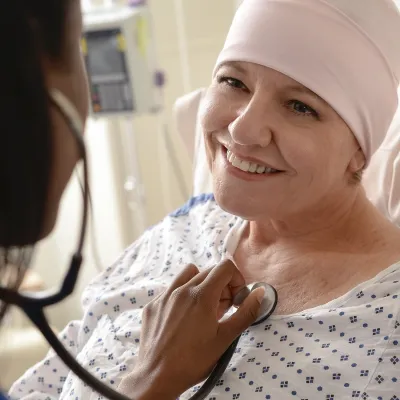
Expert Cardio-Oncology Care Keeps Your Heart Strong
You’re stronger than you know. You’re standing up to cancer with courage, determination and hope. But the path to wellness can have obstacles, and some of the methods that treat cancer can also put your heart at risk.
At AdventHealth, your oncology and cardiovascular teams will work together closely, partnering with you to take care of your heart — before, during and after your cancer treatment. We’re right here beside you at every step, using the latest technology to monitor your heart health and care for any potential heart problems that may arise during cancer treatment.

What is Cardio-Oncology?
Cardio-oncology helps diagnose and treat cardiovascular problems that occur in those who have cancer. Often, people who have cancer have other heart disease risk factors. That’s why multidisciplinary collaboration is vital, and why our cardio-oncology team works hand in hand with the rest of your care team to provide the most personalized support.
We monitor your whole health even before you start cancer treatment by assessing your cardiovascular risk, using imaging and diagnostic tests to find existing heart or blood vessel problems. We also work to detect any new heart problems early while you’re undergoing cancer treatment.
During Treatment, We'll Protect Your Heart
- Preventative Cardio-Oncology
-
Supporting Your Cancer Journey With Proactive Heart Care
Cancer treatment is a journey, and that journey can be difficult for your heart. We want to do everything we can to make it easier, closely monitoring your heart for cardiotoxic side effects, without delaying your cancer therapy.
Some of the symptoms of a heart condition can feel similar to the side effects of your treatment, like feeling tired or a little breathless, so you might not realize that a heart problem is developing. But we will. Our cardio-oncology program specializes in the early detection of heart problems caused by cancer treatments, often before they can do any serious damage. Our network is equipped with the latest diagnostic technology for cancer-related heart problems, including:
- Computed tomography (CT) scan
- Echocardiogram
- Magnetic resonance imaging (MRI)
- Radionuclide imaging
- Ongoing Cardio-Oncology
-
Early Detection of Heart Problems During Cancer Treatment
The side effects of your treatment can be challenging, but you never have to face them alone. Learning that your cancer treatment has caused a heart condition is upsetting, but with rapid detection and intervention, it is possible to reduce or even reverse the effects.
Within our network, you’ll find leading experts in the treatment of heart failure, vascular disease and other cardiovascular conditions. You’ve got a multidisciplinary team of oncologists and cardiologists at your side who'll do everything they can to keep your heart strong and healthy.
- Lifelong Cardio-Oncology
-
Continuous, Collaborative and Compassionate Cancer Care
You’ve shown so much strength already. We're here to help you handle anything that comes your way. If a cardiac problem caused by cancer treatment develops, we want to help you find courage and healing.
Our comprehensive cardio-oncology programs unite an expert team to protect and support your heart health, including oncologists, cardiologists, specialized cardiac oncologists, radiologists and surgeons. They’ll collaborate to decide the best course of action, like adjusting your chemotherapy or radiation treatment plan, or considering other alternatives if necessary, including surgery. With timely interventions and specialized cancer therapies, we can reduce the effects of cardiac issues, and in some cases, reverse them entirely.

Cardio-Oncology You Can Count On
You’ve got this, because you’ve got us. Get the expert care and support you need to face cancer and reclaim your life.
Comprehensive Heart and Cancer Care
Wherever life takes you, find peace of mind knowing there are AdventHealth specialists to support you through every age and stage.
Learn more about other AdventHealth Heart and Vascular Care Specialties and Services.
-
General Cardiology
Our experienced cardiovascular specialists diagnose and treat the full range of vascular and arterial diseases using proven surgical and nonsurgical methods.
-
Heart Health and Prevention
We specialize in managing chronic conditions to help you thrive, and provide strategies and preventive care that can keep diseases from forming.
-
General Oncology
If you’re facing cancer, you deserve the most caring and capable medical minds in your corner. Let us put our oncology expertise to work for you.
Answering Your Questions About Cardio-Oncology
-
Q:Question: What types of cancer will benefit from cardio-oncology services?
A:Answer:Cardio-oncology services are incredibly beneficial for cancer survivors and patients undergoing treatments for cancers that may impact heart health.
Continue ReadingCollapse AnswerSome cancers that can benefit from cardio-oncology treatments are:
- Breast cancer: Certain chemotherapy drugs (like anthracyclines) and radiation therapy can increase the risk of heart problems, especially if they are used near the chest area.
- Lung cancer: Treatments such as radiation or targeted therapies may affect the heart, particularly when radiation is directed at the chest.
- Leukemia and lymphoma: Chemotherapy drugs used to treat these cancers can sometimes lead to heart complications, such as arrhythmias or heart muscle damage.
- Hodgkin’s lymphoma: Radiation therapy used to treat this cancer, especially when directed at the chest or surrounding areas, can increase the risk of heart issues.
- Prostate cancer: Certain hormone therapies and radiation treatment can sometimes have cardiovascular side effects.
-
Q:Question: How does cancer treatment affect my heart?
A:Answer:The heart and circulatory system can sometimes be affected by specific cancer treatments like chemotherapy, radiation and immunotherapy.
Continue ReadingCollapse AnswerBy working closely with oncologists and cardiologists, patients can get the best care possible for their cancer and their heart health. Cardio-oncology helps monitor, manage and minimize heart-related side effects, so you can focus on your cancer recovery with confidence.
-
Q:Question: Am I at risk for heart problems due to my cancer treatment?
A:Answer:The risk depends on the type of cancer treatment you are receiving and your individual health history.
Continue ReadingCollapse AnswerFor example, chemotherapy drugs like anthracyclines and certain radiation therapies, particularly when directed at the chest area, are known to increase the risk of heart problems. Additionally, pre-existing conditions like high blood pressure or diabetes can make the heart more vulnerable. Your doctor can assess your risk and help monitor and manage your heart health during treatment.
-
Q:Question: What heart conditions should I be aware of during cancer treatment?
A:Answer:There are several heart conditions to be aware of during cancer treatment.
Continue ReadingCollapse AnswerThese conditions include:
- Heart failure: The heart muscle may weaken, making it harder for the heart to pump blood effectively.
- Arrhythmias: Cancer treatments can cause irregular heart rhythms, leading to palpitations or dizziness.
- Coronary artery disease: Radiation therapy, particularly around the chest area, can increase the risk of narrowing blood vessels, potentially leading to chest pain or heart attacks.
- Pericardial disease: Inflammation of the lining around the heart can sometimes occur, especially after radiation therapy.
-
Q:Question: How can I prevent heart problems while undergoing cancer treatment?
A:Answer:There are several ways to prevent heart problems while you’re undergoing cancer treatment.
Continue ReadingCollapse AnswerThese methods include:
- Regular monitoring: Working closely with your oncologist and cardiologist to monitor your heart health is key to catching issues early.
- Adopting a heart-healthy lifestyle: Eating a balanced diet, staying active, managing stress and avoiding smoking can help protect your heart.
- Medication: Your doctor may recommend medications to control blood pressure, cholesterol or other factors that affect heart health.
- Adjusting cancer treatment: In some cases, treatment plans may be adjusted to reduce the impact on the heart without compromising cancer care.
-
Q:Question: Should I be seeing a cardiologist while undergoing cancer treatment?
A:Answer:If you're receiving treatments that could affect your heart, it’s a good idea to work with a cardiologist during your cancer treatment.
Continue ReadingCollapse AnswerThey can help monitor your heart function, manage any emerging issues and ensure that your cancer treatments don’t negatively affect your heart health. A cardiologist will also be there to provide guidance and support throughout your cancer journey.
-
Q:Question: What tests will be done to monitor my heart during cancer treatment?
A:Answer:Your doctor may recommend several tests to monitor your heart health during cancer treatment.
Continue ReadingCollapse AnswerThese tests could include:
- Echocardiograms (echo): An ultrasound of your heart to assess its function and structure.
- Electrocardiograms (ECG): To check for abnormal heart rhythms.
- Blood tests: To measure heart-related biomarkers and detect early signs of damage.
- MUGA scans: A type of nuclear scan to measure how well your heart is pumping blood.
- Cardiac MRI: In some cases, this may be used for a more detailed view of the heart.
-
Q:Question: Can a cardio-oncologist help me if I already have heart disease and need cancer treatment?
A:Answer:A cardio-oncologist can absolutely help you if you need cancer treatment and are already living with heart disease.
Continue ReadingCollapse AnswerCardio-oncology is designed to support patients with pre-existing heart conditions who need cancer treatment. A cardio-oncologist will work with your oncologist to adjust treatment options, monitor your heart health and minimize risks. This collaborative approach ensures that both your cancer and heart health are managed at the same time, giving you the best chance for successful treatment outcomes.